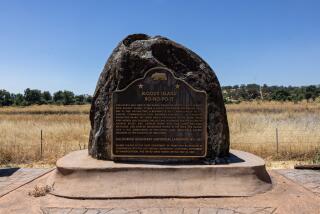Vote May Be Stevens’ Last Stand in Effort to Help Sioux
- Share via
Almost a year since he vowed to help the Sioux Indians achieve their 111-year-old dream of recovering the sacred Black Hills of South Dakota, Newport Beach millionaire Philip Stevens has found the task more daunting and frustrating than he ever imagined.
In the time since Stevens stepped forward to offer his expertise as a successful entrepreneur to help the Sioux, the eight tribes of the Great Sioux Nation are no closer to recovering even a single acre of Black Hills land, much less the 1.3-million-acre tract of unoccupied, federally owned territory they have demanded.
And to make matters worse, some Indian leaders say the entrance of Stevens has only served to further divide the already fractious attempt to reach some kind of reservation-wide consensus on how to go about getting some of the Sioux land back.
In a word, it has not been one of Phil Stevens’ better years.
Now Stevens is threatening to withdraw from the fray--some Sioux leaders have been asking him to do that all along--if he loses a referendum vote on the issue. As proposed by Stevens, the referendum would be held on the eight reservations to determine who the Sioux want to lead the fight to recover the Black Hills: Stevens or the Black Hills Steering Committee, a group of Sioux leaders who have been working toward that end for several years now.
“If I lose the referendum, in the interest of unity I will back out,” Stevens said recently. “But the kindest thing people could do is to let them vote as soon as possible. The Sioux have a right to decide this.”
But like most things on the reservation, even the idea of a vote has stirred controversy. Gerald Clifford, a Sioux leader who sits on the Steering Committee, calls the idea just another scam by Stevens to impose his will over an impoverished people. Clifford said the vote probably won’t be held and that the tribal councils would not be bound by its outcome anyway. Stevens argued that the vote is the only reliable way to learn exactly what the 68,000 Sioux people want.
Stevens grew up on the streets of East Los Angeles and made his mark in the defense industry, eventually founding Irvine-based Ultrasystems Inc., and eletronics firm. He became interested in the Sioux several years ago when he had a spiritual reawakening, rediscovering his own Sioux blood.
What he set out to do seemed simple enough: to help the Sioux realize the long-held dream of recovering part of the Black Hills that were taken in 1877 in violation of the Ft. Laramie Treaty.
The problem was that Sen. Bill Bradley (D-N.J.), Clifford and the Black Hills Steering Committee had already been working toward that goal. Bradley had sponsored a bill awarding the Sioux 1.3 million acres of unoccupied federal land, but because of opposition from South Dakota’s two senators and other interests it never cleared committee.
Stevens believed that he could not only help break the congressional logjam but could also sweeten the deal by demanding that the federal government award the Sioux $3.1 billion in compensation for tons of gold and silver that were taken from the Black Hills after the land was seized.
Clifford argued that by demanding a huge monetary settlement, Stevens was in effect killing whatever slim chances the Bradley bill had of passing. And some are still puzzled as to why Stevens, in his quest to lead the Sioux, demanded last year that he be installed as “special chief” in an elaborate ceremony that stirred resentment among many of the older, more traditional Sioux.
“Phil Stevens has devoted a year’s worth of time up here and all he has been successful at has been dividing the people,” Clifford said in a telephone interview. “Certainly with the degree of poverty and vulnerability that we have here, when someone comes along and flashes a couple of bucks, he can win some friends. That is fine and dandy for attracting a crowd, but it certainly didn’t buy us any serious support.”
Of the eight tribes, Stevens currently has the support of only one. But that is enough, Clifford said, to torpedo any chances the Bradley bill had of winning congressional approval.
Greg McCarthy, Bradley’s assistant press secretary, confirmed Clifford’s fears. While the senator still supports the partial return of the Black Hills, he said Bradley was reluctant to reintroduce the bill without the full support of all eight tribal councils.
Still, Stevens and his supporters see the referendum as the only way to let the Sioux speak for themselves.
“I see these people dying up there, and the people believe they should stand up and fight for what is theirs and not take a penny less than they deserve,” he said. “I say let’s give the people a chance to decide their destiny and future. I am willing to accept the will of the people.”
More to Read
Sign up for Essential California
The most important California stories and recommendations in your inbox every morning.
You may occasionally receive promotional content from the Los Angeles Times.













